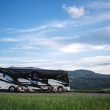We’re sure some of you have considered boondocking if you haven’t already done it. Maybe you like the idea of solitude, lower or no camping fees, and being as close to nature as possible. Or it’s possible that you’re tired of crowded campgrounds with that nonstop generator noise. Whatever your reasoning, boondocking is a great way to experience the birds, trees, the sun, and your RV with no distractions.
Boondocking Etiquette for Beginners
The main thing to remember about boondocking is to be prepared. It’s one thing to forget something at home if you’re headed to a campground, but it’s another story if you forget something before you head out boondocking. Keep reading for more tips on boondocking etiquette and how to make your boondocking trip as fruitful as possible!
There is proper boondock etiquette.
Just like with campgrounds, there are a few simple rules to follow when you decide to venture away from your favorite campground. Be respectful of your boondocking neighbors. So, don’t set up camp too close to someone else. Giving you and your neighbor plenty of space shouldn’t be a problem, anyway. Don’t blare your music too loudly in the still of the night, either. Music tends to carry pretty far, regardless of how loud you think it is.
Clean up.
This should really be obvious, but another rule is to leave the area just as you found it, or cleaner. Do NOT leave any trash behind, put out campfires, and don’t dump grey or black water on the ground. It’s as simple as that!
Think about the local wildlife.
After all, we’re intruding on their area, so boondocking in the wild is not without risk. Some common sense can go a long way in this situation. Keep your camp clean and put away food and trash immediately so they don’t tempt any unwelcome visitors. If an animal does approach your camp, give them space and take photos from afar if you must. If the animal looks or seems upset, you might be too close.
You can boondock no matter the size of your RV.
Sure, a 45’ motorhome probably won’t fit in the same areas as a pop-up or expandable, but the size of your RV really doesn’t matter. There are literally tons of places to boondock around the country. Just do your research on the places you’ll like and fit into best. The west has several large areas of public land with no obstacles like trees or small roads that are great for people with larger RVs. Don’t let the size of your motorhome dictate what you do and the places you visit!
Find your destinations ahead of time.
In order to know if your RV will make the trip to your destination, you have to know the roads and conditions. The last thing you want is to start parading down a tiny, narrow road with no way to turn around in your motorhome after you’ve already driven five miles down. If you’re towing a vehicle, find a safe place to park your RV and use your vehicle to scout the ideal area for boondocking. Another idea is to even stay in a nearby campground for a night or two until you find an awesome place to start your boondocking adventure. Information on how to find the perfect area is out there! You can ask park rangers, locals who camp often, read travel blogs or ask campground employees. No matter what you do, you have to scout ahead to ensure the best boondocking experience.
Know the regulations.
We talked about rules, but when it comes to regulations, there are some. It may be hard to tell, but not all vast areas are subject to boondocking. There are few ways to make sure you’re aren’t camping where you’re not supposed to be, and the easiest one is to check with the local rangers. All of the national forests are split by district and managed by different rangers. An internet search will tell you where each office is located or the best ways to reach out to them. If you stop by, their offices are normally stocked with tons of detailed maps and the rangers can tell you which areas are boondock friendly. Another simple way is to buy the Benchmark Road and Recreation Atlases. Again, these are filled with maps that are marked with public land boundaries. Worried about the price? You’re saving lots of money from avoiding those camping fees, so the price is most definitely worth it.
Be ready for emergencies.
You’re going to be more than likely outside of any decent cell phone service range, so it’s crucial to be prepared in case something happens. Be sure to pack a first aid kit or two, emergency roadside tools, and some basic tools are always good to have (a wrench, hammer, screwdriver, etc.) Since you probably won’t be around any purified water, a water purification device is good to have, too.
Consider what to do for security.
Several boondocks will say they don’t feel any less safe camping out in nature than they do in the middle of a campground or city. Bad or dangerous things can happen anywhere, but that doesn’t mean that you shouldn’t take precautions around your boondocking area. At the end of the night and when you’re away from your camp, put away expensive items like fishing poles, bikes, grills, generators, etc. You should also think about personal safety. Store some mace at the door to your RV, maybe a firearm as long as you stay within that state’s regulations or even a baseball bat next to your bed. You can never be sure what will happen and you can never be too safe.
What are your tips for boondocking etiquette? Let us know!






